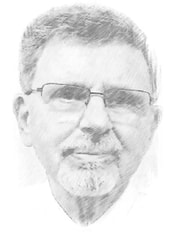- Terry DeFoe - Cora Lynn Deibler - Mondo de La Vega - Roy Delia -
==terry defoe======
Pastor Terry Defoe is an emeritus member of the clergy who served congregations in Western Canada from 1982 to 2016, and who ministered to students on the campuses of the University of British Columbia and Simon Fraser University. He is the author of Evolving Certainties: Resolving Conflict at the Intersection of Faith and Science, a book which, among other things, chronicles his transition from Young Earth Creationism to evolutionary creation. Evolving Certainties is endorsed by scientists in biology, geology and physics, with a foreword written by Darrel Falk, former president of BioLogos, an organization that has as its goal the facilitating of respectful discussion of science / faith issues. Defoe has been educated at: Simon Fraser University (BA Soc); Lutheran Theological Seminary, Saskatoon, Saskatchewan (M.Div.); and, Open Learning University, Burnaby, British Columbia (BA Psyc). In Evolving Certainties he compares scientific and religious worldviews, each, in its own way, seeking truth. His interest in science and evolution was initially prompted by a desire to get beyond typical young earth creationist claims and investigate the message science is trying to convey, with the goal of determining whether that message is inherently corrosive to the Christian faith and biblical authority. He argues that, rather than challenging faith, evolutionary science has the very real potential of enhancing faith as humanity slowly pulls back the curtain on what the abundant evidence, from disciplines as disparate as cosmology, geology and biology, has to say about God's creative activity.
 Terry Defoe
Terry Defoe
In their article, “Galileo and Global Warming,” Rachel Roller and Louise Huang point out interesting similarities between a 16th century theological controversy involving Galileo Galilei and the contemporary evangelical response to global warming.
Nicolaus Copernicus (1473-1543) lived around the time of Luther (1483-1546). Copernicus was a Catholic priest who studied the heavens. Based on his observations, he proposed the counter-intuitive idea that the earth orbits the sun, a theory called heliocentrism. This idea was later picked up by Galileo (1564-1642) in Italy. And Galileo’s telescope showed that it was, in fact, true.
Galileo’s claims were rejected by theologians of the day because he had the temerity to challenge orthodoxy, which, based on several verses of the Bible, argued that the earth does not move. Some individuals were invited to look through Galileo’s telescope and see the evidence for themselves. They refused, saying that God didn’t intend for human beings to have telescopic vision, a classic example of motivated denial.
The current controversy over global warming is therefore not the first time that Christians have been reluctant to accept implications of new scientific evidence. In our day, climate change has implications for how we perceive and interact with the natural world, and it requires significant societal and economic changes to mitigate its impacts. Those who work diligently to communicate the needs regarding climate change and global warming find it easy to feel overwhelmed, considering the opposition they often face. The magnitude of the problem and the complexity of its causes and solutions can make it feel like an uphill battle.
Acceptance of climate science is more likely when issues are framed in ways that resonate with rather than threaten group identity. It is counterproductive to force people into an ideological corner. It’s critical to get people of different persuasions to work together on issues of mutual interest. Evangelicals are called upon to be good stewards of God’s creation. Dealing with climate change gives them a chance to do just that. --Terry DeFoe; Righting America; Evangelicals and Climate Change Denialism 7.26.23
Nicolaus Copernicus (1473-1543) lived around the time of Luther (1483-1546). Copernicus was a Catholic priest who studied the heavens. Based on his observations, he proposed the counter-intuitive idea that the earth orbits the sun, a theory called heliocentrism. This idea was later picked up by Galileo (1564-1642) in Italy. And Galileo’s telescope showed that it was, in fact, true.
Galileo’s claims were rejected by theologians of the day because he had the temerity to challenge orthodoxy, which, based on several verses of the Bible, argued that the earth does not move. Some individuals were invited to look through Galileo’s telescope and see the evidence for themselves. They refused, saying that God didn’t intend for human beings to have telescopic vision, a classic example of motivated denial.
The current controversy over global warming is therefore not the first time that Christians have been reluctant to accept implications of new scientific evidence. In our day, climate change has implications for how we perceive and interact with the natural world, and it requires significant societal and economic changes to mitigate its impacts. Those who work diligently to communicate the needs regarding climate change and global warming find it easy to feel overwhelmed, considering the opposition they often face. The magnitude of the problem and the complexity of its causes and solutions can make it feel like an uphill battle.
Acceptance of climate science is more likely when issues are framed in ways that resonate with rather than threaten group identity. It is counterproductive to force people into an ideological corner. It’s critical to get people of different persuasions to work together on issues of mutual interest. Evangelicals are called upon to be good stewards of God’s creation. Dealing with climate change gives them a chance to do just that. --Terry DeFoe; Righting America; Evangelicals and Climate Change Denialism 7.26.23
==cora lynn deibler======
 Cora Lynn Deibler
Cora Lynn Deibler
“I’m sad that fundamentalists have taken over Christianity and made religion a bad thing. Christian fundamentalism is misguided and hurtful and dangerous. Fundamentalists in any major world religion make trouble, and I’m disappointed they’ve stolen the good things that faith practices can bring to societies.” --Cora Lynn Deibler 12.9.22
“I’m sad that fundamentalists have taken over Christianity and made religion a bad thing. Christian fundamentalism is misguided and hurtful and dangerous. Fundamentalists in any major world religion make trouble, and I’m disappointed they’ve stolen the good things that faith practices can bring to societies.” --Cora Lynn Deibler 12.9.22
 Cora Lynn Deibler
Cora Lynn Deibler
“There were white Christian nationalist candidates across the country who embody the things we are critiquing in the video. Those signs didn’t encourage my vote. They said to me of those who posted them, ‘I’m bigoted, I’m misogynistic, I’m xenophobic, I’m homophobic, and I’m OK with that.’ And a shockingly large number of people are ready to support that.”” --Cora Lynn Deibler; Professors Challenge Christian Right to Live Out Their Faith with Humility and Compassion 12.9.22
==mondo de la vega======
Mondo De La Vega, Executive Vice President of Television Production and Co-Host of The Jim Bakker Show. He is also known for his creative contributions as a Director and Producer of nationally syndicated television shows.
May 9, 2023: Charisma: The Jim Bakker Show’s Mondo De La Vega Reveals Reasons for Hope in Texas Mall Shooting Aftermath
Sitting down for an exclusive interview with Charisma News, host of “The Mondo Show” and co-host of “The Jim Bakker Show” Mondo De La Vega shares a deeper look into the spiritual battle taking place in America today.
Sitting down for an exclusive interview with Charisma News, host of “The Mondo Show” and co-host of “The Jim Bakker Show” Mondo De La Vega shares a deeper look into the spiritual battle taking place in America today.
 Mondo de La Vega
Mondo de La Vega
“We’re witnessing what I believe the Bible talks about in 2 Timothy chapter 3, that we have become lovers of ourselves. Meaning that we want so much about us, and everything is about us. And a lot of these individuals, quite frankly, get inspired by other people that do this......The church, along with hospitals that deal with mental health issues, need to come together and resolve the problems that are taking place in our community with individuals that need our help." --Mondo de La Vega; The Jim Bakker Show; May 2023
==r0y delia======
Roy Delia left the Roman Catholic Church and started attending Bible-preaching, Independent Baptist churches that brought him to receive Christ as Saviour at the age of 32. The Lord called him into the ministry and became a pastor at the age of 38. After pastoring a church for 12 years and serving in another for several more years in Washington State, the Lord led him to eastern Oregon where he pastored a small church for five years and then started New Hope Baptist Church in Ontario in March of 2009.
 Roy Della
Roy Della
The true Christian, led by the Holy Spirit, has a hunger and thirst after righteousness (Matthew 5:6), but is impeded by the old nature which hungers after the fulfillment of fleshly desires. This is why it is important for a Christian to daily spend time in prayer and Bible study, and to also unite with a Bible-believing local church. These things help us to overcome the world, the flesh, and the devil.
Again, as Paul wrote to the churches of Galatia to help them overcome: “This I say then, Walk in the Spirit, and ye shall not fulfil the lust of the flesh. For the flesh lusteth against the Spirit, and the Spirit against the flesh: and these are contrary the one to the other: so that ye cannot do the things that ye would” (Galatians 5:16, 17). In the succeeding verses he describes the contrast between the Spirit and the flesh. I encourage you to read them. -Rev Roy Delia; New Hope Baptist Church; Ontario, Oregon
Again, as Paul wrote to the churches of Galatia to help them overcome: “This I say then, Walk in the Spirit, and ye shall not fulfil the lust of the flesh. For the flesh lusteth against the Spirit, and the Spirit against the flesh: and these are contrary the one to the other: so that ye cannot do the things that ye would” (Galatians 5:16, 17). In the succeeding verses he describes the contrast between the Spirit and the flesh. I encourage you to read them. -Rev Roy Delia; New Hope Baptist Church; Ontario, Oregon


